The most popular thing I've ever done on this platform was a collection of literary breakfasts, so, in a shameless bid for further fame and adulation, here follows something similar on coffee.
I'll admit to enjoying a few too many while gathering and clipping, but I'm pleased to report that I remain some way short of the 50-a-day Voltaire is said to have consumed. Likewise, I've avoided the pyramid of sugar protruding above the rim of the mug that Kierkegaard is said to have enjoyed.
Anyway, insofar as any particular themes or patterns have emerged, there's coffee as ritual (Stein, Woolf), coffee as intellectual and creative stimulant (Balzac, Sowayan), coffee as a threshold between states (Murakami, Darwish), but most of all it's just coffee as pleasure, plain and simple.
If you enjoy this, you might also be interested in:
Still from Twin Peaks: The Return (2017)
‘All the world, we mean all those who have partaken of true coffee, have observed the effects of this liquid on themselves. On taking this drink one feels the sentiment of well being and hope; melancholy is dissipated; one feels capable of doing, because of a condition of strength. Coffee is truly a brain stimulant. Under its influence conception is clearer and animation more prompt. Imagination does not appear to be put in motion, while memory and the will are mostly benefitted by this cerebral disturbance. For some coffee is a poison that acts upon the central nervous system; more particularly upon the cerebral lobes, according to Foinac. It acts then in the manner of alcohol, but in an inverse sense. Alcohol and opium produce congestion of the brain. Coffee deter-mines, to the contrary, an anæmia of that organ. Still this theory is far from being absolutely proved.’
Extract from the Cincinnati Lancet-Clinic Weekly Journal of Medicine and Surgery, 1893
‘Coffee glides into one’s stomach and sets all of one’s mental processes in motion… Memories charge in, bright flags on high; the cavalry of metaphor deploys with a magnificent gallop; the artillery of logic rushes up with clattering wagons and cartridges; on imagination’s orders, sharpshooters sight and fire; forms and shapes and characters rear up; the paper is spread with ink – for the nightly labor begins and ends with torrents of this black water, as a battle opens and concludes with black powder’
Honoré de Balzac, The Pleasure and Pains of Coffee, c.1830
Henri de Toulouse-Lautrec, Coffee Pot, 1884
‘When his father told him about his alarm at having forgotten even the the day might come when things would be recognized by their inscriptions but that no one would remember their use. Then he was more explicit. The sign that he hung on the neck of the cow was an exemplary proof of the way in which the inhabitants of Macondo were prepared to fight against loss of memory: "This is the cow. She must be milked every morning so that she will produce milk, and the milk must be boiled in order to be mixed with coffee to make coffee and milk." Thus they went on living in a reality that was slipping away, momentarily captured by words, but which would escape irremediably when they forgot the values of the written letters.’
Gabriel García Márquez, One Hundred Years of Solitude, 1967
‘Coffee is a lot more than just a drink; it’s something happening. Not as in hip, but like an event, a place to be, but not like a location, but like somewhere within yourself. It gives you time, but not actual hours or minutes, but a chance to be, like be yourself, and have a second cup’
Gertrude Stein, Selected Writings, 1946
Ernst Ludwig Kirchner, Coffee Drinking Women, 1907
‘I want the aroma of coffee. I need five minutes. I want a five-minute truce for the sake of coffee. I have no personal wish other than to make a cup of coffee. With this madness I define my task and my aim. All my senses are on their mark, ready at the call to propel my thirst in the direction of the one and only goal: coffee.
Coffee for an addict like me, is the key to the day.
And coffee, for one who knows it as I do, means making it with your own hands and not having it come to you on a tray, because the bringer of the tray is also the bearer of talk, and the first coffee, the virgin of the silent morning, is spoiled by the first words. Dawn, my dawn is antithetical to chatter. The aroma of coffee can absorb sounds and will go rancid, even if these sounds are nothing more than a gentle 'Good Morning!'
Coffee is the morning silence, early and unhurried, the only silence in which you can be at peace with self and things, creative, standing alone with some water that you read for in lazy solitude and pour into a small copper pot with a mysterious shine—yellow turning to brown—that you place over a low fire. Oh, that it were a wood fire!’
Mahmoud Darwish, Memory of Forgetfulness, 1995
‘Molly, my sister and I fell out,
And what do you think it was all about?
She loved coffee and I loved tea,
And that was the reason we couldn’t agree.’
Traditional nursery rhyme
‘When the coffee arrived, Fido looked at me, waiting for orders. I just focused on the cup of iced coffee, overflowing with whipped cream and topped with a cherry; I was half meditating, half nodding, like a man appreciating a work of art. He took that as a sign that he could start drinking. And so, with total composure, he raised the cup to his lips, no longer feeling any need to pay attention to me. I was the lucky one, for I was free to drink in his beauty and youth with my eyes. I was getting a lot for my money.’
Zhu Tianwen, Notes of a Desolate Man, 1994
‘The fresh smell of coffee soon wafted through the apartment, the smell that separates night from day.’
Haruki Murakami, Colorless Tsukuru Tazaki and His Years of Pilgrimage, 2013
‘Coffeehouses are places where pleasure-seekers and wealthy gadabouts sit knee-to-knee, involving themselves in all sorts of vulgar behaviour; in fact, even before the dervish houses are closed, coffeehouses ought to be banned. Do the poor have enough money to drink coffee? Men frequent these places, become besotted with coffee and lose control of their mental faculties to the point that they actually listen to and believe what dogs and mongrels have to say. But those who curse me and our religion, it is they who are the true mongrels.’
Orhan Pamuk, My Name is Red, 1998 (using the voice of an 16th century Ottoman religious scholar)
Ottoman miniature of a Meddah performing at a coffeehouse
‘Take it all back. Life is boring, except for flowers, sunshine, your perfect legs. A glass of cold water when you are really thirsty. The way bodies fit together. Fresh and young and sweet. Coffee in the morning. These are just moments. I struggle with the in-betweens. I just want to never stop loving like there is nothing else to do, because what else is there to do?’
Pablo Neruda
‘Tighten your fingers around a teaspoon, feel its metal pulse, its mistrustful warning. How it hurts to refuse a spoon, to say no to a door, to deny everything that habit has licked to a suitable smoothness. How much simpler to accept the easy request of the spoon, to use it, to stir the coffee.’
Julio Cortázar, Cronopios and Famas, 1962
‘That morning Tea Cake got up earlier than Janie did. She felt sleepy and told him to go get some fish to fry for breakfast. By the time he had gone and come back she would have finished her nap out. He told her he would and she turned over and went back to sleep. She woke up and Tea Cake still wasn’t there and the clock said it was getting late, so she got up and washed her face and hands. Perhaps he was down in the kitchen fixing around to let her sleep. Janie went down and the landlady made her drink some coffee with her because she said her husband was dead and it was bad to be having your morning coffee by yourself’
Zora Neale Hurston, Their Eyes Were Watching God, 1937
Louis-Marin Bonnet, The Woman Taking Coffee, 1774
‘Some friends, with whom I had gone out to the country, witnessed me arguing about everything, haranguing with monumental bad faith. The following day I recognized my wrongdoing and we searched the cause. My friends were wise men of the first rank, and we found the problem soon enough: coffee wanted its victim.’
Honoré de Balzac, The Pleasure and Pains of Coffee, c.1830
‘I hear about Borges in letters, I see his name on a roster of professors and in the biographical gazetteer. I like hourglasses, maps, eighteenth-century typeface, the taste of coffee, and Stevenson’s prose. The other one likes the same things, but his vanity transforms them into theatrical props.’
Jorge Luis Borges, Borges and I, 1957
‘One grand boulevard with trees / with one grand cafe in sun / with strong black coffee in very small cups. / One not necessarily very beautiful / man or woman who loves you. / One fine day.’
Lawrence Ferlinghetti (1919-2021), Recipe for Happiness
‘The Grain or Berry called Coffee, groweth upon little Trees, only in the Deserts of Arabia.
It is brought from thence, and drunk generally throughout all the Grand Seigniors Dominions.
It is a simple innocent thing, composed into a drink, by being dryed in an Oven, and ground to Powder, and boiled up with Spring water, and about half a pint of it to be drunk, fasting an hour before and not Eating an hour after, and to be taken as hot as possibly can be endured; the which will never fetch the skin off the mouth, or raise any Blisters, by reason of that Heat.’
Advertisment for St. Michael’s Alley, the first cafe in London, c.1562
An engraved illustration of the interior of a café in Baghdad, Iraq
‘For I have known them all already, known them all: / Have known the evenings, mornings, afternoons, / I have measured out my life with coffee spoons; / I know the voices dying with a dying fall / Beneath the music from a farther room. / So how should I presume?’
T. S. Eliot, The Love Song of J. Alfred Prufrock
‘Poetic cogitation is not only compared to manual labor (e.g., carving, hewing, building, weaving, threading,) but in some instances it is accompanied by physical activity such as the making of coffee. When the poet feels the spark of inspiration stirring inside him, he fixes himself a cup of coffee to clear his head and help him compose. Coffee making is as elaborate and absorbing a ritual as composition. The way a man makes his coffee is his nümās, since it reflects his nimbleness, alertness, composure, tact, and taste. A man takes as much pride in his coffee making as he does in his poetic composition. Coffee making involves building the fire, washing the cups and pots, boiling the water, slowly roasting the coffee beans, pounding the roasted beans rhythmically in a brass mortar, throwing the ground coffee into the boiling pot, letting it boil for a few minutes, drawing it away from the fire and letting it settle, crushing the cardamom seeds, casting the right amount of crushed cardamom into a fresh pot, pouring the coffee that was left to settle into this fresh pot, letting it just come to a boil with the cardamom, withdrawing the pot from the embers, and leaving it for a while to settle and become clear. In other words, coffee making and composition are both patterned activities, except that one is manual whereas the other is purely mental. It is this resemblance in one way and difference in another that makes these two activities go together so nicely; each is in some way a mimesis of the other. While the poet makes his coffee he also makes his poem, deciding its rhyme, meter, and opening line, which is called mišadd, from the verb sadd (to saddle a camel mount), because the other verses of the poem ride upon the first line; that is, they depend on it, in rhyme and meter. By the time the coffee is ready, the poem is well on its way’
Saad Abdullah Sowayan, Nabati Poetry: The Oral Poetry of Arabia, 1985
‘O Coffee, thou dost dispel all care, thou art the object of desire to the scholar’
Anon Arabic poem, c.1511
‘I’m sick for real. Rosario is making me stay in bed. Before she left for work she went out to borrow a thermos from a neighbour and she left me half a litre of coffee. Also four aspirin. I have a fever. I’ve started and finished two poems.’
Roberto Bolano, The Savage Detectives, 1998
Still from Jum Jarmusch's Coffee and Cigarettes, 2003
‘Mm! how sweet the coffee tastes, more delicious than a thousand kisses, mellower than muscatel wine. Coffee, coffee I must have, and if someone wishes to give me a treat, ah, then pour me out some coffee!’
Lyrics from J.S. Bach's Coffee Cantata, c.1735
‘How much better is silence; the coffee cup, the table. How much better to sit by myself like the solitary sea-bird that opens its wings on the stake. Let me sit here for ever with bare things, this coffee cup, this knife, this fork, things in themselves, myself being myself.’
Virginia Woolf, The Waves, 1931
‘That’s what I do: I make coffee and occasionally succumb to suicidal nihilism. But you shouldn't worry - poetry is still first’
Ann Sexton
Henri Matisse, Laurette with a Cup of Coffee, 1916–1917





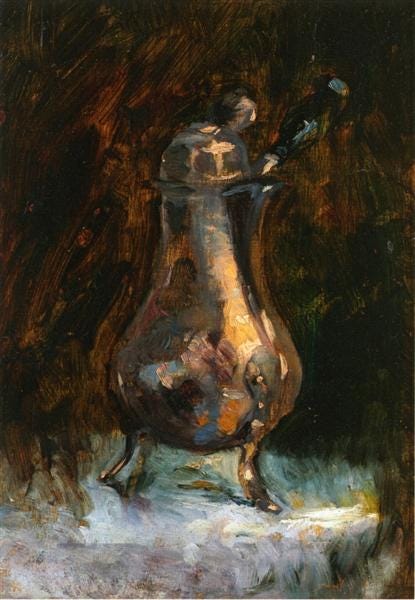
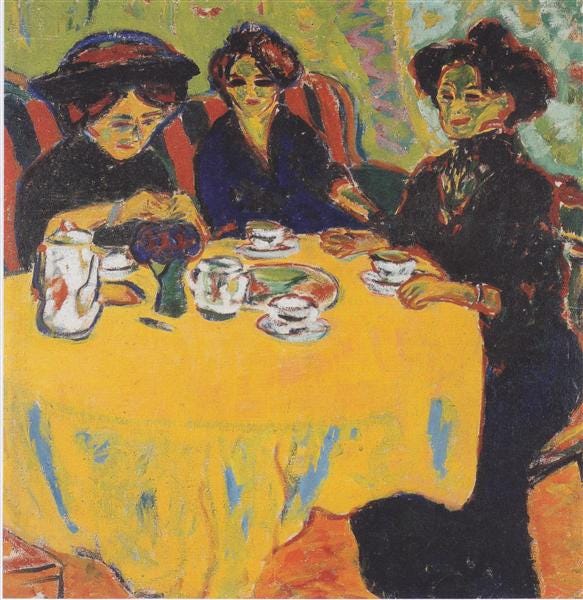
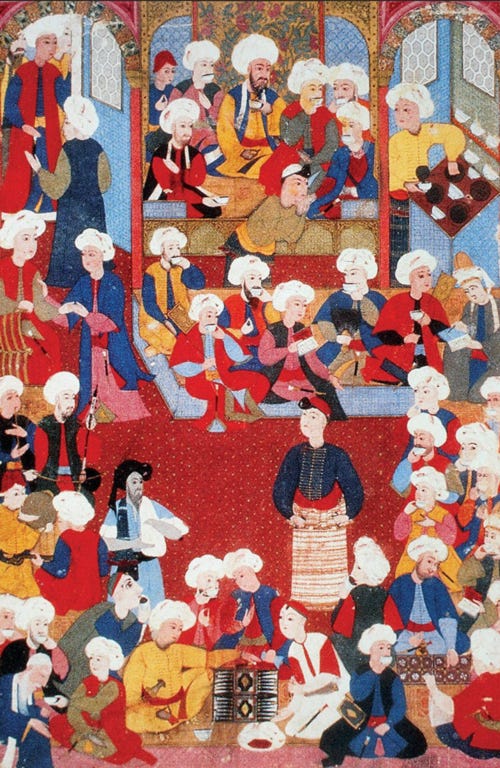

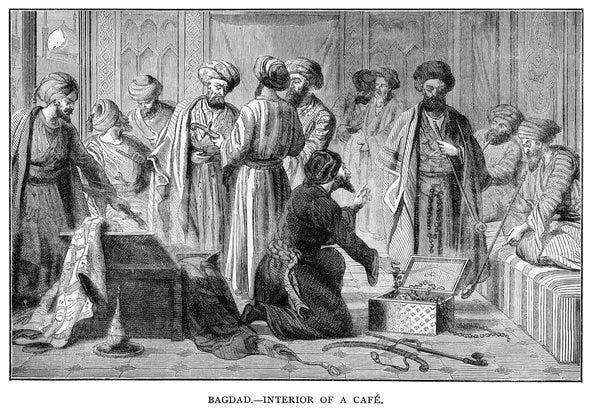
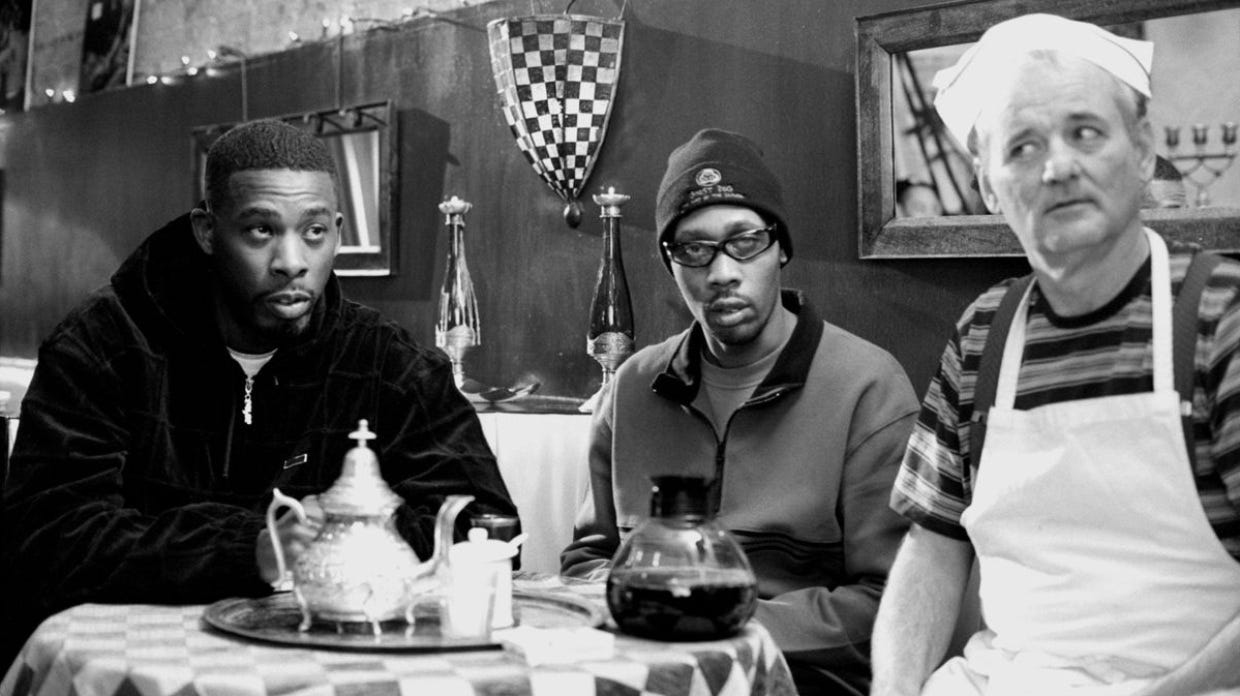

Lovely! Thank you so much.
My favourite coffee description is from Miss Smilla’s Feeling for Snow - Peter Hoeg: First he grinds a lot of light-coloured beans and then some which are tiny, almost black, and shiny as glass. He mixes them in a little metal funnel which he attaches to an espresso machine, which he places on a gas hob. People acquire bad coffee habits in Greenland. I pour hot milk right on to the Nescafé. I’m not above dissolving the powder in water straight from the hot-water tap. He pours one-part whipping cream and two-parts whole milk into two tall glasses with handles. When he draws out the coffee from the machine, it’s thick and black like crude oil. Then he froths the milk with the steam nozzle and divides the coffee between the two glasses. We take it to the sofa. I do appreciate it when someone serves me something good. In the tall glasses the drink is dark as an old oak tree and has an overwhelming, almost perfumed tropical scent. “I was following you,” he says. The glass is scorching hot. The coffee is scalding.
I keep coming back to this. It feels like that edit of Anime foods that goes viral every once in a while across the internet. And I love coffee so much.